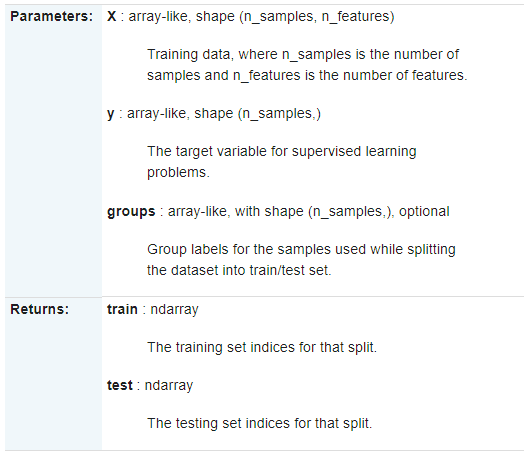【模型评估与选择】sklearn.model_selection.KFold
1. 描述
KFold divides all the samples in k groups of samples, called folds (if k = n, this is equivalent to the Leave One Out strategy), of equal sizes (if possible). The prediction function is learned using k - 1 folds, and the fold left out is used for test.
2. 语法
sklearn.model_selection.KFold(n_splits=3, shuffle=False, random_state=None)
3. 参数:
1. n_splits: int, default=3
Number of folds. Must be at least 2.
将训练/测试数据集划分n_splits个互斥子集,每次用n_splits-1个子集的并集作为训练集,余下的子集作为测试集
2. shuffle:boolean, optional
Whether to shuffle the data before splitting into batches.
shuffle= False:不洗牌,每次运行结果相同,相当于random_state=整数
shuffle=True:洗牌,每次运行结果不同
shuffle=True和random_state=整数: 每次运行结果相同
3. random_state: int, RandomState instance or None, optional, default=None
If int, random_state is the seed used by the random number generator;
If RandomState instance, random_state is the random number generator;
If None, the random number generator is the RandomState instance used by np.random. Used when shuffle == True.
4. 方法
1. get_n_splits([X, y, groups])
Returns the number of splitting iterations in the cross-validator
2. split(X[, y, groups])
Generate indices to split data into training and test set.

注:Randomized CV splitters may return different results for each call of split. You can make the results identical by setting random_state to an integer.
5. 实例
X = np.array([[1, 2], [3, 4], [1, 2], [3, 4]])
y = np.array([1, 2, 3, 4])
kf = KFold(n_splits=3)
kf.get_n_splits(X)
print(kf)
for train_index, test_index in kf.split(X):
print("TRAIN:", train_index, "TEST:", test_index)
X_train, X_test = X[train_index], X[test_index]
y_train, y_test = y[train_index], y[test_index]
print(X_train,y_train)
print(X_test,y_test)
KFold(n_splits=3, random_state=None, shuffle=False)
TRAIN: [2 3] TEST: [0 1]
TRAIN: [0 1 3] TEST: [2]
TRAIN: [0 1 2] TEST: [3]
[[1 2]
[3 4]
[1 2]] [1 2 3]
[[3 4]] [4]
注:
The first n_samples % n_splits folds have size n_samples // n_splits + 1, other folds have size n_samples // n_splits, where n_samples is the number of samples.
拓展
StratifiedKFold
Takes group information into account to avoid building folds with imbalanced class distributions (for binary or multiclass classification tasks).
GroupKFold
K-fold iterator variant with non-overlapping groups.
RepeatedKFold
Repeats K-Fold n times.